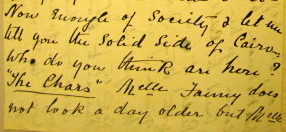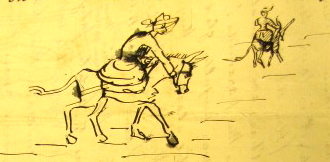Juliette “Daisy” Gordon Low attended a boarding school in New York City when she was in her teens. The school was run by two sisters, Matilde and Fanny Charbonnier, known to the students as “The Chars.” Daisy enjoyed them both, but never so much as when she encountered them unexpectedly in Egypt in 1891. “Who do you think are here?” she wrote her friend Mary Clarke, with that tone of wonderment every student has upon seeing a teacher outside the school building.
 It was an especially wonderful thing to meet them at that time and place because Daisy had reached her fill of parties and longed to be out and exploring beyond the confines of Cairo’s British community. Daisy’s husband Willy Low was with her, but she could not persuade him to leave the “swells.” “Every other man one meets is a Duke,” she wrote, with not a little exasperation. Nor could Daisy pry Willy away from a certain Miss Little, a charmer she described as extremely interested in sports, “rowdy,” “pretty,” and contemptuous of other women. The Chars’ serendipitous appearance gave Daisy the excuse she wanted to leave behind dukes, duchesses, horse races, and Miss Little.
It was an especially wonderful thing to meet them at that time and place because Daisy had reached her fill of parties and longed to be out and exploring beyond the confines of Cairo’s British community. Daisy’s husband Willy Low was with her, but she could not persuade him to leave the “swells.” “Every other man one meets is a Duke,” she wrote, with not a little exasperation. Nor could Daisy pry Willy away from a certain Miss Little, a charmer she described as extremely interested in sports, “rowdy,” “pretty,” and contemptuous of other women. The Chars’ serendipitous appearance gave Daisy the excuse she wanted to leave behind dukes, duchesses, horse races, and Miss Little.
Besides, the Chars were just as glad to see their former pupil as she was thrilled to encounter them–despite the decade that had passed since they’d last been together. “Both [my] cheeks tingle still,” she admitted to Mary, “with the repeated embraces that have been showered upon them.” The three women set off on a jaunt to see the sights. They began with ancient Memphis. To investigate the ruins, they had to travel “2 hours on a Nile boat & 3 hours on donkeys!” She drew a picture of their progress in her epistle to Mary:
“Poor Mlle. Matilde!,” Daisy continued, “Her donkey fell and really gave her a bad shaking, but her one idea seemed to be the horror of the exposé…” The elderly Matilde would not tip the Egyptian donkey boy, “because he did not decently cover up her ankles with her frock, but tried to catch his runaway donkey instead.”
After this amusing aside, Daisy grew serious: “Really it is a liberal education to go about with them. I am so stupid and they know so much. I am glad to find enthusiasts in the sight-seeing because I can go about in society in England, but I may never have another such chance to learn and see as I now have.”
Daisy Gordon Low did travel in the best circles in England, but a big and passionate part of her thirsted always for things more real and substantial than fancy dress balls and house parties. That part–raised on the importance of duty by her parents, and nurtured by her religious views–is what responded so fiercely and positively when she first heard about Girl Scouts.
_______________
Juliette Gordon Low to Mary Carter Clarke, 12 March 1891, Clarke Family Papers, MS2800, Box 9, Folder 16, Cornell University, Ithaca, New York.



Stacy
A most interesting story. It clearly shows Willy’s character – constantly sucking up to the gentry, chasing the ladies and neglecting Daisy’s needs. It is such a small world for a chance meeting with her former school teachers like that to enable Daisy to leave the confines of “safety” and see some more of the real Egypt. It is also sad that Matilde was more concerned for her own modesty than the urgent needs of the donkey boy in catching his donkey. More of this type of story please!
Brilliant.
Clive
Clive–you are very kind! I’m glad you liked this tale.
I hope that the book is full of stories like this, but I shall do my best on future blogs. Thanks for reading–and writing!